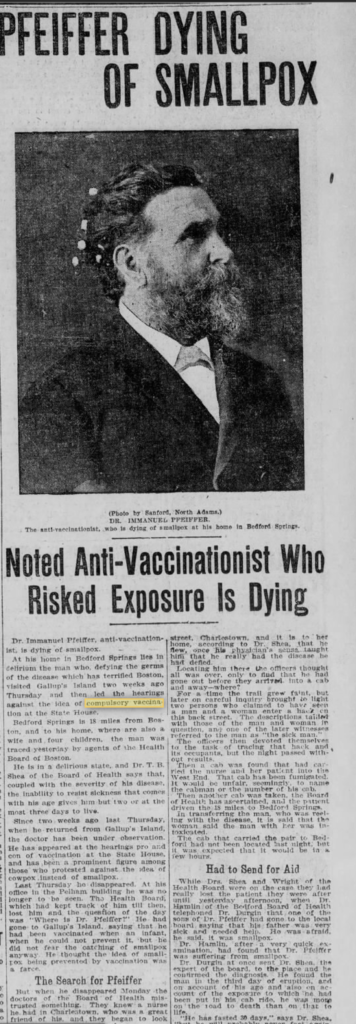The Volokh Conspiracy
Mostly law professors | Sometimes contrarian | Often libertarian | Always independent
Revised, and Expanded Version of The Irrepressible Myth of Jacobson v. Massachusetts
I wrote an extended discussion of the significance of the $5 fine in 1905.
Earlier this week, I posted a draft of my article, The Irrepressible Myth of Jacobson v. Massachusetts. I received several comments about the relevance of the $5 fine to Justice Harlan's decision. I have revised, and expanded the paper to address some of these comments. I encourage people to read Part II.C.5, titled "Jacobson's implied constraint." I do not think the quantity of the penalty is part of the case's holding, but I think it provides an implied constraint. And even if you disagree on this point, there are many good reasons to limit Jacobson to its facts. This case--which is out of step with a century of caselaw--should be buried, not revived.
Of special interest to readers, I broke down the relevant fines in other Progressive Era Supreme Court cases. $5 was on the very, very low side. Here is an excerpt:
In 1885, Lee Yick—better known as Yick Wo—was fined $10 for operating a wooden laundry in San Francisco without a permit.[1] Joseph Lochner was "sentenced to pay a fine of $50" for violating the New York Bakeshop Act.[2] The Oregon law limiting the number of hours women could work, which Curt Muller violated, authorized "a fine of not less than $10 nor more than $25."[3] In 1908, Berea College of Kentucky was fined $1,000 for integrating its classrooms.[4] Frank Meyer was convicted of violating Nebraska law for teaching his students German.[5] The 1919 statute permitted "a fine of not less than twenty-five dollars ($25), nor more than one hundred dollars ($100)."[6] Oregon parents who sent their children to private school, in violation of the state's compulsory education law, would "be subject to a fine of not less than $5, nor more than $100, or to imprisonment in the county jail not less than two nor more than thirty days."[7] Leo Nebbia violated New York's price control laws for milk.[8] This offense was "punishable by not more than a year's imprisonment, or not more than $100 fine or both.[9] Fines in other prominent contemporary cases were even higher.
Several years ago, I started a paper about the relationship between economic liberty and criminal law. The project sputtered out, but I had the penalty amounts at the ready.
I also went through Chapter 75 of the Revised Laws, which included all of Massachusett's public health laws. No penalty was as low as $5. Most were far higher. My favorite: "[B]ath[ing] in a pond, stream or reservoir, the water of which is used for the purpose of domestic water supply for a city or town, shall be punished by a fine of not more than ten dollars."
Finally, I went through the archives to find out more about legislative debates concerning Massachusetts's vaccination bill. This headline proves nothing ever changes. 
For those curious, Dr. Pfeiffer did not die from smallpox. The next day, the paper published a small article noting he recovered.
Editor's Note: We invite comments and request that they be civil and on-topic. We do not moderate or assume any responsibility for comments, which are owned by the readers who post them. Comments do not represent the views of Reason.com or Reason Foundation. We reserve the right to delete any comment for any reason at any time. Comments may only be edited within 5 minutes of posting. Report abuses.
Please to post comments


The last smallpox outbreak of Boston and the approach that the Boston Board of Health adopted was discussed in the February 1, 2001 issue of the New England Journal of Medicine :
This epidemic illustrates the importance of applying modern medical science (in this case, vaccination) to an acute public health problem, educating the medical community and the general public about the benefits of prevention, and having public debate on the pros and cons of public health policies aimed at prevention. Some aspects of the epidemic remain disturbing. The Board of Health's policy toward the homeless and the challenge to those who opposed vaccination to expose themselves to smallpox showed a disregard for civil liberties and for ethical concerns. Such abuses underscore the importance of an ethical framework for public health and medicine that includes the oath to “do no harm,” respect for individual autonomy, and the requirement of informed consent.
See:
The Last Smallpox Epidemic in Boston and the Vaccination Controversy, 1901–1903
N Engl J Med 2001; 344:375-379
DOI: 10.1056/NEJM200102013440511
"I wrote an extended discussion of the significance of the $5 fine in 1905."
I wasn't aware you were alive in 1905?
He can prove using originalist historical analysis that he was.
Manuel Talley was fined $10 for publishing a flyer. 1960. Margaret McIntyre was fined $100 for publishing a flyer. 1995. The FEC routinely fines people thousands of dollars for publishing flyers, enforcing a statute and regulation of the sort found unconstitutional in Talley and McIntyre.